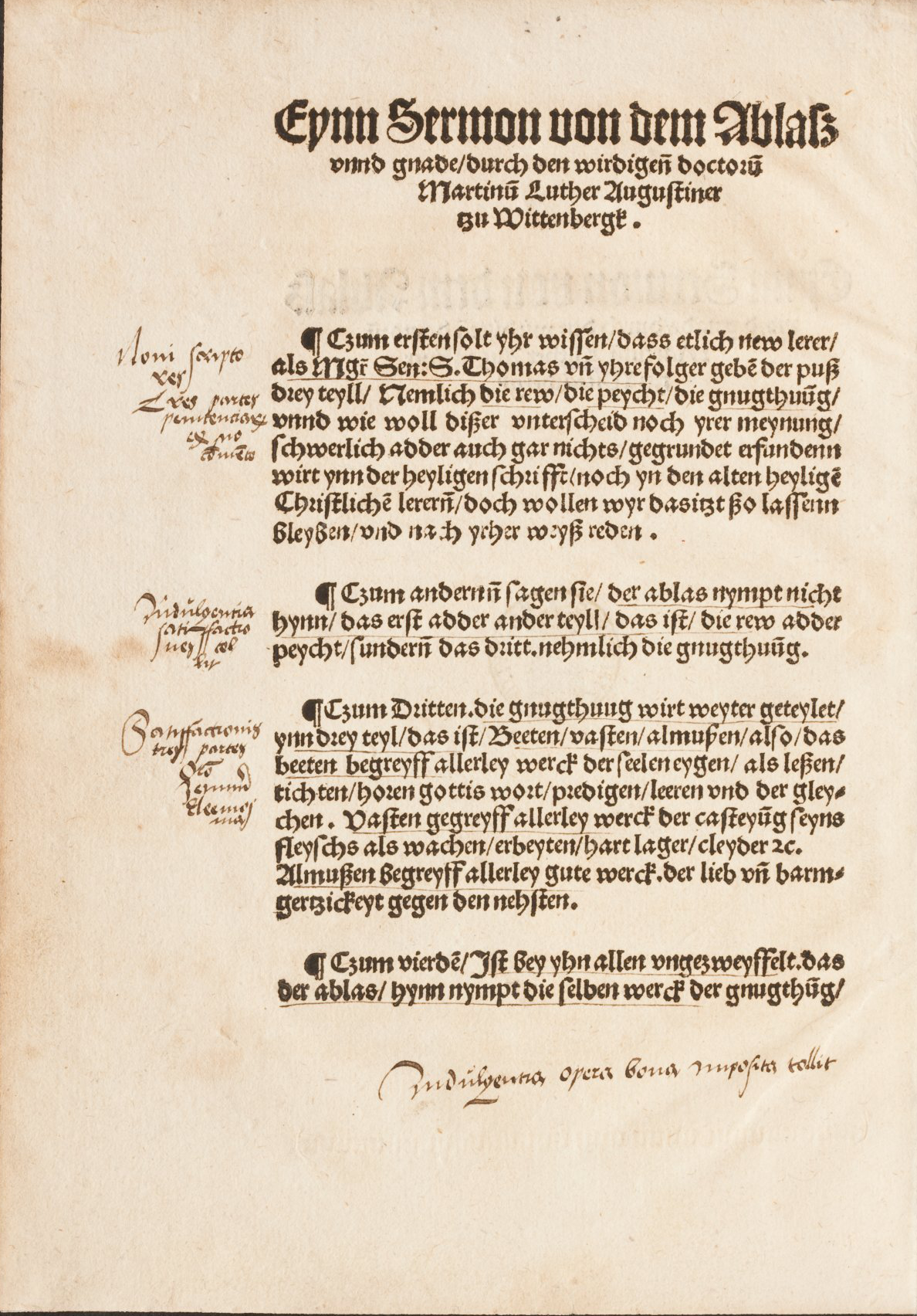Sermon on Indulgences and Grace on:
[Wikipedia]
[Google]
[Amazon]


Martin Luther
Martin Luther (; ; 10 November 1483 – 18 February 1546) was a German priest, theologian, author, hymnwriter, and professor, and Order of Saint Augustine, Augustinian friar. He is the seminal figure of the Reformation, Protestant Refo ...
's ''Sermon on Indulgences and Grace'' (german: Eynn Sermon von dem Ablasz und Gnade) is a pamphlet
A pamphlet is an unbound book (that is, without a hard cover or binding). Pamphlets may consist of a single sheet of paper that is printed on both sides and folded in half, in thirds, or in fourths, called a ''leaflet'' or it may consist of a ...
written in Wittenberg
Wittenberg ( , ; Low Saxon language, Low Saxon: ''Wittenbarg''; meaning ''White Mountain''; officially Lutherstadt Wittenberg (''Luther City Wittenberg'')), is the fourth largest town in Saxony-Anhalt, Germany. Wittenberg is situated on the Ri ...
in the latter part of March, 1518 and published in April of that year.
The sermon
A sermon is a religious discourse or oration by a preacher, usually a member of clergy. Sermons address a scriptural, theological, or moral topic, usually expounding on a type of belief, law, or behavior within both past and present contexts. El ...
itself was written as Luther directly addressing his audience. It stresses good works and sincere repentance over indulgences
In the teaching of the Catholic Church, an indulgence (, from , 'permit') is "a way to reduce the amount of punishment one has to undergo for sins". The '' Catechism of the Catholic Church'' describes an indulgence as "a remission before God o ...
, with Luther criticizing indulgences as non-scriptural and the Catholic clergy
The sacrament of holy orders in the Catholic Church includes three orders: bishops, priests, and deacons, in decreasing order of rank, collectively comprising the clergy. In the phrase "holy orders", the word "holy" means "set apart for a sa ...
as being greedy and wasting money on St. Peter's Basilica when it could be better spent on the poor in their own neighbourhoods.
Impact
The pamphlet was an instant hit and was reprinted 14 times in 1518 alone, in print runs of at least 1,000 copies. It is regarded by many as the true starting point of theReformation
The Reformation (alternatively named the Protestant Reformation or the European Reformation) was a major movement within Western Christianity in 16th-century Europe that posed a religious and political challenge to the Catholic Church and in ...
. Luther wrote the sermon in German, unlike his 95 Theses (written in Latin
Latin (, or , ) is a classical language belonging to the Italic branch of the Indo-European languages. Latin was originally a dialect spoken in the lower Tiber area (then known as Latium) around present-day Rome, but through the power of the ...
), and avoided regional vocabulary to ensure that his words were intelligible across all Germanic lands. This helped the work quickly reach a wide audience.
The sermon swept through the major centres of the Holy Roman Empire
The Holy Roman Empire was a Polity, political entity in Western Europe, Western, Central Europe, Central, and Southern Europe that developed during the Early Middle Ages and continued until its Dissolution of the Holy Roman Empire, dissolution i ...
, and the broader reading public first came to know something of Luther through it. It has been described as "the world's first printed bestseller".
Wolfgang Capito
Wolfgang Fabricius Capito (also Koepfel) ( – November 1541) was a German Protestant reformer in the Calvinist tradition.
His life and revolutionary work
Capito was born circa 1478 to a smith at Hagenau in Alsace. He attended the famous Latin ...
thought highly of Luther's sermon.
The sermon was countered by Johann Tetzel
Johann Tetzel (c. 1465 – 11 August 1519) was a German Dominican friar and preacher. He was appointed Inquisitor for Poland and Saxony, later becoming the Grand Commissioner for indulgences in Germany. Tetzel was known for granting indulgence ...
in his ''Vorlegung'' (Presentation) condemning twenty errors of Luther."The Oxford encyclopedia of the Reformation", by Hans J. Hillerbrand and Hans J. Hillerbrand.
References
{{Authority control 1518 books 16th-century Christian texts Works by Martin Luther